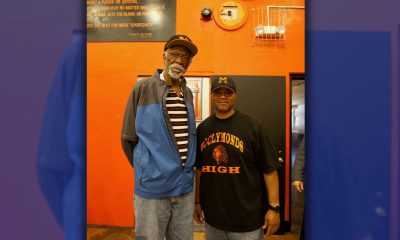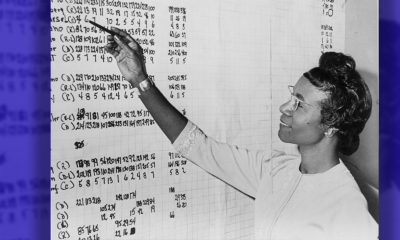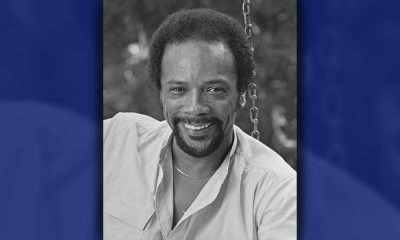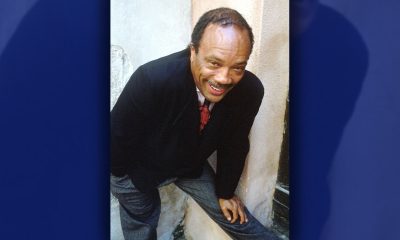Politics
Illinois Clears Major Hurdle for Obama Library in Chicago

President Barack Obama speaks at Anacostia Library in Washington, Thursday, April 30, 2015, as he participates in a live “virtual field trip” with middle school students to announce two initiatives to improve education through digital connectivity. (AP Photo/Susan Walsh)
Sophia Tareen, ASSOCIATED PRESS
CHICAGO (AP) — One of the remaining obstacles to building Barack Obama’s presidential library in his hometown of Chicago fell away when Illinois Gov. Bruce Rauner signed legislation Friday strengthening the city’s legal ability to build the project on public park land.
The decision to locate the legacy project where Obama started his political career wasn’t a surprise. But it hit snags when the University of Chicago initially failed to secure park land and when an advocacy group objected and threatened a lawsuit like one it filed to stop lakefront construction on “Star Wars” creator George Lucas’ proposed museum.
The measure, which Rauner said would benefit the city and state, changes Illinois law to let Chicago build museums on park or “formerly submerged” land, such as the Lake Michigan-adjacent property where Lucas wants to build.
“Both of those developments will be strong economic drivers for the state of Illinois,” Rauner told reporters during a Friday stop in southwest Illinois, “helping the overall Illinois economy as well as the Chicago economy with tourism and visitors, and help create jobs and more tax revenue.”
Obama’s library will be built on Chicago’s South Side, where the University of Chicago has proposed two potential sites not far from the Obama family’s home. The Barack Obama Foundation, which was deciding between university bids in Illinois, Hawaii and New York, was expected to release details within weeks. Two people with knowledge of the decision confirmed to The Associated Press that Chicago had been chosen. They spoke on condition of anonymity because it hasn’t been publicly announced.
The office of Chicago Mayor Rahm Emanuel, Obama’s former White House chief of staff, declined to comment ahead of an official announcement, as did the University of Chicago and University of Hawaii. Columbia University officials in New York didn’t immediately comment.
Friends of the Parks, which filed the lawsuit to stop construction of the Lucas museum, said they welcomed Chicago as a choice for the Obama library. But they urged against using park land, saying it could set a dangerous precedent. Before the Illinois legislation emerged — which legislators fast-tracked last month — Friends of the Parks argued the Lucas museum site was a protected waterway.
They said they were considering a similar lawsuit regarding the library. However, the group didn’t mention it Friday.
“We admire your record as a champion of the environment, including the park system in your home town,” the group said in a statement directed at Obama. “Please leave us the double legacy of a world class library and world class parks.”
The group’s objections have stood out among residents, activists and clergy members who largely agree that Chicago wins no matter where the library’s built. Supporters of a location on the South Side — home to historically significant black neighborhoods — called it ideal for the library of the nation’s first black president.
Bishop Larry Trotter of the roughly 10,000-member Sweet Holy Spirit Church, likened it to a “monument” of hope. U.S. Rep. Bobby Rush, a Chicago Democrat, called the library a “significant milestone” for Chicago in an audio statement. Bernita Johnson-Gabriel, head of a neighborhood organization, deemed it a “catalytic” opportunity to generate jobs and create new businesses for area residents.
“This is a wonderful, wonderful opportunity for young people who I’m sure wonder on a daily basis why their community doesn’t have the same amenities as other communities,” she said.
___
Associated Press writer Josh Lederman in Washington, Alan Scher Zagier in Belleville, Illinois, and Sara Burnett in Chicago, contributed to this report.
___
Follow Sophia Tareen at http://twitter.com/sophiatareen.
Copyright 2015 The Associated Press. All rights reserved. This material may not be published, broadcast, rewritten or redistributed.
###
Activism
OP-ED: AB 1349 Puts Corporate Power Over Community
Since Ticketmaster and Live Nation merged in 2010, ticket prices have jumped more than 150 percent. Activities that once fit a family’s budget now take significant disposable income that most working families simply don’t have. The problem is compounded by a system that has tilted access toward the wealthy and white-collar workers. If you have a fancy credit card, you get “presale access,” and if you work in an office instead of a warehouse, you might be able to wait in an online queue to buy a ticket. Access now means privilege.

By Bishop Joseph Simmons, Senior Pastor, Greater St. Paul Baptist Church, Oakland
As a pastor, I believe in the power that a sense of community can have on improving people’s lives. Live events are one of the few places where people from different backgrounds and ages can share the same space and experience – where construction workers sit next to lawyers at a concert, and teenagers enjoy a basketball game with their grandparents. Yet, over the past decade, I’ve witnessed these experiences – the concerts, games, and cultural events where we gather – become increasingly unaffordable, and it is a shame.
These moments of connection matter as they form part of the fabric that holds communities together. But that fabric is fraying because of Ticketmaster/Live Nation’s unchecked control over access to live events. Unfortunately, AB 1349 would only further entrench their corporate power over our spaces.
Since Ticketmaster and Live Nation merged in 2010, ticket prices have jumped more than 150 percent. Activities that once fit a family’s budget now take significant disposable income that most working families simply don’t have. The problem is compounded by a system that has tilted access toward the wealthy and white-collar workers. If you have a fancy credit card, you get “presale access,” and if you work in an office instead of a warehouse, you might be able to wait in an online queue to buy a ticket. Access now means privilege.
Power over live events is concentrated in a single corporate entity, and this regime operates without transparency or accountability – much like a dictator. Ticketmaster controls 80 percent of first-sale tickets and nearly a third of resale tickets, but they still want more. More power, more control for Ticketmaster means higher prices and less access for consumers. It’s the agenda they are pushing nationally, with the help of former Trump political operatives, who are quietly trying to undo the antitrust lawsuit launched against Ticketmaster/Live Nation under President Biden’s DOJ.
That’s why I’m deeply concerned about AB 1349 in its current form. Rather than reining in Ticketmaster’s power, the bill risks strengthening it, aligning with Trump. AB 1349 gives Ticketmaster the ability to control a consumer’s ticket forever by granting Ticketmaster’s regime new powers in state law to prevent consumers from reselling or giving away their tickets. It also creates new pathways for Ticketmaster to discriminate and retaliate against consumers who choose to shop around for the best service and fees on resale platforms that aren’t yet controlled by Ticketmaster. These provisions are anti-consumer and anti-democratic.
California has an opportunity to stand with consumers, to demand transparency, and to restore genuine competition in this industry. But that requires legislation developed with input from the community and faith leaders, not proposals backed by the very company causing the harm.
Will our laws reflect fairness, inclusion, and accountability? Or will we let corporate interests tighten their grip on spaces that should belong to everyone? I, for one, support the former and encourage the California Legislature to reject AB 1349 outright or amend it to remove any provisions that expand Ticketmaster’s control. I also urge community members to contact their representatives and advocate for accessible, inclusive live events for all Californians. Let’s work together to ensure these gathering spaces remain open and welcoming to everyone, regardless of income or background.
Activism
Oakland Post: Week of December 31, 2025 – January 6, 2026
The printed Weekly Edition of the Oakland Post: Week of – December 31, 2025 – January 6, 2026

To enlarge your view of this issue, use the slider, magnifying glass icon or full page icon in the lower right corner of the browser window.
Activism
2025 in Review: Seven Questions for Assemblymember Lori Wilson — Advocate for Equity, the Environment, and More
Her rise has also included several historic firsts: she is the only Black woman ever appointed to lead the influential Assembly Transportation Committee, and the first freshman legislator elected Chair of the California Legislative Black Caucus. She has also been a vocal advocate for vulnerable communities, becoming the first California legislator to publicly discuss being the parent of a transgender child — an act of visibility that has helped advanced representation at a time when political tensions related to social issues and culture have intensified.

By Edward Henderson, California Black Media
Assemblymember Lori D. Wilson (D-Suisun City) joined the California Legislature in 2022 after making history as Solano County’s first Black female mayor, bringing with her a track record of fiscal discipline, community investment, and inclusive leadership.
She represents the state’s 11th Assembly District, which spans Solano County and portions of Contra Costa and Sacramento Counties.
Her rise has also included several historic firsts: she is the only Black woman ever appointed to lead the influential Assembly Transportation Committee, and the first freshman legislator elected Chair of the California Legislative Black Caucus. She has also been a vocal advocate for vulnerable communities, becoming the first California legislator to publicly discuss being the parent of a transgender child — an act of visibility that has helped advanced representation at a time when political tensions related to social issues and culture have intensified.
California Black Media spoke with Wilson about her successes and disappointments this year and her outlook for 2026.
What stands out as your most important achievement this year?
Getting SB 237 passed in the Assembly. I had the opportunity to co-lead a diverse workgroup of colleagues, spanning a wide range of ideological perspectives on environmental issues.
How did your leadership contribute to improving the lives of Black Californians this year?
The Black Caucus concentrated on the Road to Repair package and prioritized passing a crucial bill that remained incomplete during my time as chair, which establishes a process for identifying descendants of enslaved people for benefit eligibility.
What frustrated you the most this year?
The lack of progress made on getting Prop 4 funds allocated to socially disadvantaged farmers. This delay has real consequences. These farmers have been waiting for essential support that was promised. Watching the process stall, despite the clear need and clear intent of the voters, has been deeply frustrating and reinforces how much work remains to make our systems more responsive and equitable.
What inspired you the most this year?
The resilience of Californians persists despite the unprecedented attacks from the federal government. Watching people stay engaged, hopeful, and determined reminded me why this work matters and why we must continue to protect the rights of every community in our state.
What is one lesson you learned this year that will inform your decision-making next year?
As a legislator, I have the authority to demand answers to my questions — and accept nothing less. That clarity has strengthened my approach to oversight and accountability.
In one word, what is the biggest challenge Black Californians are facing currently?
Affordability and access to quality educational opportunities.
What is the goal you want to achieve most in 2026?
Advance my legislative agenda despite a complex budget environment. The needs across our communities are real, and even in a tight fiscal year, I’m committed to moving forward policies that strengthen safety, expand opportunity, and improve quality of life for the people I represent.
-

 Bay Area4 weeks ago
Bay Area4 weeks agoPost Salon to Discuss Proposal to Bring Costco to Oakland Community meeting to be held at City Hall, Thursday, Dec. 18
-

 Activism4 weeks ago
Activism4 weeks agoMayor Lee, City Leaders Announce $334 Million Bond Sale for Affordable Housing, Roads, Park Renovations, Libraries and Senior Centers
-

 Activism4 weeks ago
Activism4 weeks agoOakland Post: Week of December 10 – 16, 2025
-

 Activism4 weeks ago
Activism4 weeks agoOakland School Board Grapples with Potential $100 Million Shortfall Next Year
-

 Activism4 weeks ago
Activism4 weeks ago2025 in Review: Seven Questions for Black Women’s Think Tank Founder Kellie Todd Griffin
-

 Arts and Culture4 weeks ago
Arts and Culture4 weeks agoFayeth Gardens Holds 3rd Annual Kwanzaa Celebration at Hayward City Hall on Dec. 28
-

 Advice4 weeks ago
Advice4 weeks agoCOMMENTARY: If You Don’t Want Your ‘Black Card’ Revoked, Watch What You Bring to Holiday Dinners
-

 Activism4 weeks ago
Activism4 weeks agoAnn Lowe: The Quiet Genius of American Couture






















































